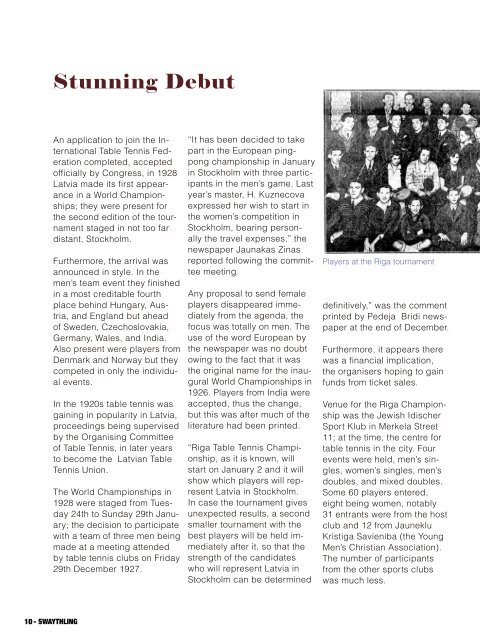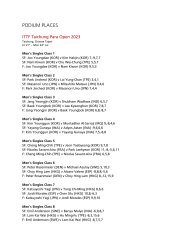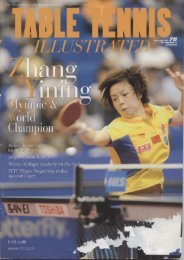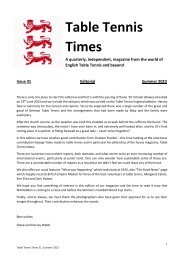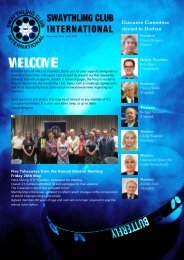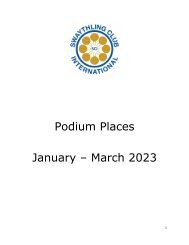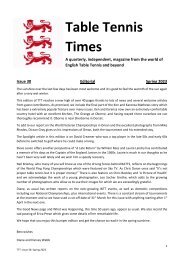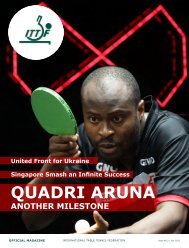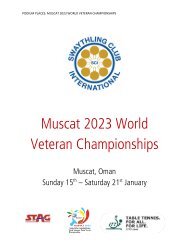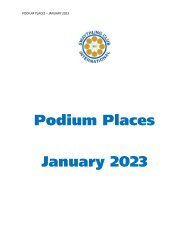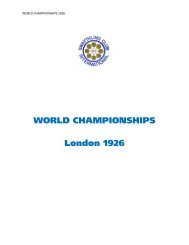Swaythling_Mag_112-1 (2023_04_26)
Create successful ePaper yourself
Turn your PDF publications into a flip-book with our unique Google optimized e-Paper software.
Stunning Debut<br />
An application to join the International<br />
Table Tennis Federation<br />
completed, accepted<br />
officially by Congress, in 1928<br />
Latvia made its first appearance<br />
in a World Championships;<br />
they were present for<br />
the second edition of the tournament<br />
staged in not too far<br />
distant, Stockholm.<br />
Furthermore, the arrival was<br />
announced in style. In the<br />
men’s team event they finished<br />
in a most creditable fourth<br />
place behind Hungary, Austria,<br />
and England but ahead<br />
of Sweden, Czechoslovakia,<br />
Germany, Wales, and India.<br />
Also present were players from<br />
Denmark and Norway but they<br />
competed in only the individual<br />
events.<br />
In the 1920s table tennis was<br />
gaining in popularity in Latvia,<br />
proceedings being supervised<br />
by the Organising Committee<br />
of Table Tennis, in later years<br />
to become the Latvian Table<br />
Tennis Union.<br />
The World Championships in<br />
1928 were staged from Tuesday<br />
24th to Sunday 29th January;<br />
the decision to participate<br />
with a team of three men being<br />
made at a meeting attended<br />
by table tennis clubs on Friday<br />
29th December 1927.<br />
“It has been decided to take<br />
part in the European pingpong<br />
championship in January<br />
in Stockholm with three participants<br />
in the men’s game. Last<br />
year’s master, H. Kuznecova<br />
expressed her wish to start in<br />
the women’s competition in<br />
Stockholm, bearing personally<br />
the travel expenses,” the<br />
newspaper Jaunakas Zinas<br />
reported following the committee<br />
meeting.<br />
Any proposal to send female<br />
players disappeared immediately<br />
from the agenda, the<br />
focus was totally on men. The<br />
use of the word European by<br />
the newspaper was no doubt<br />
owing to the fact that it was<br />
the original name for the inaugural<br />
World Championships in<br />
19<strong>26</strong>. Players from India were<br />
accepted, thus the change,<br />
but this was after much of the<br />
literature had been printed.<br />
“Riga Table Tennis Championship,<br />
as it is known, will<br />
start on January 2 and it will<br />
show which players will represent<br />
Latvia in Stockholm.<br />
In case the tournament gives<br />
unexpected results, a second<br />
smaller tournament with the<br />
best players will be held immediately<br />
after it, so that the<br />
strength of the candidates<br />
who will represent Latvia in<br />
Stockholm can be determined<br />
Players at the Riga tournament<br />
definitively,” was the comment<br />
printed by Pedeja Bridi newspaper<br />
at the end of December.<br />
Furthermore, it appears there<br />
was a financial implication,<br />
the organisers hoping to gain<br />
funds from ticket sales.<br />
Venue for the Riga Championship<br />
was the Jewish Idischer<br />
Sport Klub in Merkela Street<br />
11; at the time, the centre for<br />
table tennis in the city. Four<br />
events were held, men’s singles,<br />
women’s singles, men’s<br />
doubles, and mixed doubles.<br />
Some 60 players entered,<br />
eight being women, notably<br />
31 entrants were from the host<br />
club and 12 from Jauneklu<br />
Kristiga Savieniba (the Young<br />
Men’s Christian Association).<br />
The number of participants<br />
from the other sports clubs<br />
was much less.<br />
Two tournaments needed<br />
A detailed schedule in place,<br />
the largest entry was in the<br />
men’s singles with no shortage<br />
of matches, four groups, 16<br />
players in each group, the top<br />
four from each group advancing<br />
to a final group.<br />
Eventually, first place went<br />
to brothers, who in the local<br />
press and programme at the<br />
1928 World Championships,<br />
were named Rosenthal I and<br />
Rosenthal II; both were members<br />
of the Idischer Sport<br />
Klub, third place was gained<br />
by 17-year-old Arnold Osins<br />
from Jauneklu Kristiga Savieniba.<br />
Helena Kuznecova, representing<br />
1. Rigas Riteņbrauceju<br />
Biedriba (1st Riga Cycling Association),<br />
who had offered to<br />
pay her own way to the World<br />
Arnold Osins<br />
Championships, won the women’s<br />
singles finishing ahead of<br />
Anna Dauksa from the Union<br />
Sports Club Union. The men’s<br />
doubles was claimed by the<br />
Rosenthal brothers, the mixed<br />
by Rosenthal II in partnership<br />
with Z. Halfina.<br />
However, the tournament did<br />
not meet the intended aim.<br />
Mordecai Finbergs (also referred<br />
to as Markus Finbergs)<br />
withdrew from the tournament.<br />
Thus, a special competition<br />
involving the top three players<br />
from the Riga Championships<br />
plus Mordecai Finbergs was<br />
staged on Monday 9th January.<br />
Once again, the Idischer<br />
Sport Klub being the venue.<br />
The so-called “round robin”<br />
format, each player competing<br />
Modecai Finbergs<br />
against each other was the<br />
order of proceedings; points<br />
awarded for matches won,<br />
there was a tie for first place,<br />
the same for third position.<br />
Play-off matches were held,<br />
Rosenthal I beat Mordecai<br />
Finbergs to secure top spot,<br />
Rosenthal II overcame Arnold<br />
Osins to reserve third place.<br />
However, owing to costs it was<br />
decided only to send two players,<br />
each receiving 150 Latvian<br />
lats; any balance had to be<br />
met by the players. Travel was<br />
expensive, it was winter, there<br />
was no regular steam ship<br />
between Riga and Stockholm,<br />
the journey had to be via Tallinn,<br />
the capital of Estonia. The<br />
only option was to travel to<br />
Tallinn, then to Turku in Finland<br />
and on to Stockholm.<br />
10 - SWAYTHLING SWAYTHLING - 11


